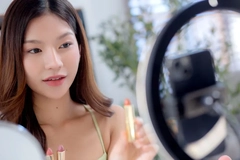COP28 delegation plans to turn tide on harmful sargassum seaweed through upcycled cosmetics applications
07 Dec 2023 --- Maritime nations meeting at COP28 in Dubai find “economic opportunity” in problematic sargassum, a brown seaweed that spreads rapidly, choking out coastal species while emitting harmful greenhouse gasses once it washes up on shores.
Efforts are underway to scale its upcycling potential in cosmetics as well as fertilizers, electricity and biomass.
The EU and the Dominican Republic government co-organized the “COP 28 Sargassum Panel — Urgency and Opportunities for Action and Investment” at the Dominican Republic Pavilion, to try to “consolidate understanding, review ongoing experiences and identify opportunities for future joint actions.”
Yesterday, the panel brought together the Barbados, Dominican Republic and Mexico governments alongside regional actors such as the Caribbean Community, the Central American Commission on Environment and Development and representatives from the private sector.

 More than a decade has passed since the first mass strandings of sargassum in the Latin America and Caribbean region (Image credit: European Commission).“More than a decade has passed since the first mass strandings of sargassum in the Latin America and Caribbean region [and] countries are faced with exponentially increasing accumulations on their shores,” states the European Commission.
More than a decade has passed since the first mass strandings of sargassum in the Latin America and Caribbean region (Image credit: European Commission).“More than a decade has passed since the first mass strandings of sargassum in the Latin America and Caribbean region [and] countries are faced with exponentially increasing accumulations on their shores,” states the European Commission.
“The trend continues to impact key coastal ecosystems contributing to major negative economic, environmental and health impacts.”
The forum follows the EU-CELAC summit in July 2023, where global leaders pledged to work together to combat sargassum in the Caribbean. The pervasive seaweed is expected to be a key talking point at the UN Conference on the Oceans which will take place in 2025 in Nice, France.
Netting new biomaterials
The forum at COP28 builds on the EU-Caribbean Sargassum conference held last June in Santo Domingo, Dominican Republic.
At the Dubai summit, the EU launched “Turning sargassum into an economic opportunity,” an initiative to reduce the damage caused by sargassum and “integrate them into the circular economy.” It includes aspects related to monitoring, research and the “mobilization of resources to maximize impact.”
One of the luminaries behind new uses for sargassum is Carbonwave, a developer of ultra-regenerative, plant-based biomaterials from seaweed. Aside from scaling cosmetics uses for the rampant marine crop, the company is exploring applications in vegan leather and as an algae fertilizer.
Carbonwave developed SeaBalance, a cosmetic emulsifier derived from sargassum. “Unlike traditional emulsifiers that may contain harmful chemicals, SeaBalance offers a natural and eco-friendly alternative,” details the company.
“It not only ensures effective emulsification in cosmetic products but also supports the reduction of plastic waste in the beauty industry…With SeaBalance, Carbonwave is empowering cosmetic companies to create products that include an upcycled element and are kinder to both skin and the environment.”
Carbonwave believes the annual Sargassum bloom has grown to 20–30 megatons in the Caribbean, resulting in significant methane emissions from rotting biomass, biodiversity loss in coral reef and beach ecosystems, and a 35% decline in tourism across the Caribbean before the pandemic.
 Carbonwave developed SeaBalance, a cosmetic emulsifier derived from sargassum (Image credit: Carbonwave).The company underscores that sargassum contains several beneficial components that can be extracted and used to create other products that various industries desperately need. However, it warns it must be done sustainably while keeping sargassum’s “good elements” intact throughout the extraction process.
Carbonwave developed SeaBalance, a cosmetic emulsifier derived from sargassum (Image credit: Carbonwave).The company underscores that sargassum contains several beneficial components that can be extracted and used to create other products that various industries desperately need. However, it warns it must be done sustainably while keeping sargassum’s “good elements” intact throughout the extraction process.
In March, Biesterfeld, a global distributor of plastics, rubber and specialty chemicals, took over the distribution of Carbonwave’s SeaBalance 2000 product for the DACH region, Poland and the Baltic States exclusively, expanding its European reach.
Science of sargassum
Sargassum, a genus of brown algae in the Sargassaceae family, is commonly found in tropical and subtropical coastal areas, with more than 400 species distributed in almost all marine basins. The seaweed is rich in carbohydrates, proteins, amino acids, vitamins, minerals, dietary fiber and carotenoids.
In recent research, South Korean cosmetic manufacturer BioSpectrum found that an extract of one type of sargassum, Sargassum fusiforme — an edible variety known as hijiki — induces melanogenesis, the hyperpigmentation activity. This points to its applicability in improving the loss of hair color and vitiligo by stimulating melanin synthesis.
In September last year, the National Research Foundation of Korea revealed further insights into the nutraceutical uses of Sargassum spp. extract in the healthy aging space.
By Benjamin Ferrer














